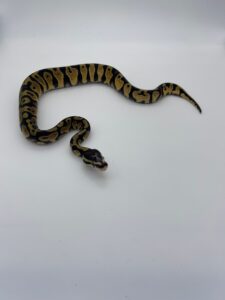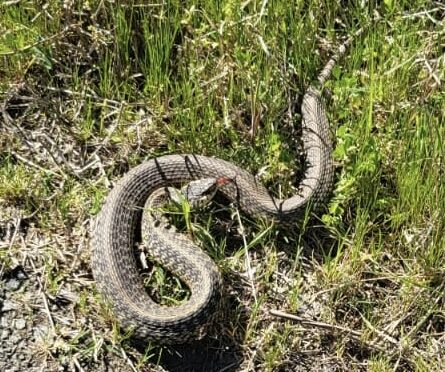Note: The following post originally ran May 7, 2010. It’s been updated, and the information on snake ID is as relevant today as it was 12 years ago.
Wednesday, I was hiking along the North Prong of Shining Rock Creek, a lively mountain stream that plunges 2,200 feet in just three miles through a narrow, overgrown canyon. I was in a reveric trance, lulled in part by the rugged vegetation here in the Shining Rock Wilderness, in part by the cloudless, 70-degree spring afternoon, when —
Whoa!
I like snakes, but their sudden appearance four feet away causes me to stop in my tracks and say, “Whoa!” Such impromptu meetups are common this time of year, as we humans hit the trail more and rising temperatures activate these cold-blooded critters. Being in the sun rejuvenates our spirit, it jumpstarts their system.
After catching my breath, I scoped out the critter, taking a couple of pictures, jotting some notes, searching my increasingly porous memory for clues about what kind of snake it might be. Not that my database was brimming to begin with.
When it comes to snakes and birds, I don’t expend a lot of my remaining gray storage memorizing types and species. Two reasons: One, there are thousands of species to begin with, and two, the same critter can look completely different depending on various factors:
 Sex. Male birds generally are more colorful than females (the cardinal).
Sex. Male birds generally are more colorful than females (the cardinal).
Location: Corn snakes throughout much of North Carolina tend to be mostly brown or gray; in the Coastal Plain, they’re bright orange.
Age: Adults of most species may have completely different coloration than they do as juveniles.
When it comes to snakes, the only thing I try to remember is whether one is harmful. This one, I knew, was not one of the state’s venomous six.
But curiosity persisted: What sort of nonvenomous snake was it?
Easy enough to find out, I discovered, at the “Snakes of North Carolina Online Identification System” run by the Davidson College Herpetology Laboratory.
The site asks 11 questions about your snake, starting with “Snake Length,” and a reminder that it’s common to overestimate length. That caused me to think, then scale back from 3 feet to 2. Other questions:
Location Where Found: Mountains (easy enough, out of six obvious choices from the drop-down menu).
Body Form: “Moderate,” “Slender” and “Stocky” are the options, with definitions of each to help. Mine was definitely “Stocky” (“thicker than a pencil”).
Scale type: This is where the “I don’t know” default came in handy; I didn’t get anywhere close enough to tell if they were “Smooth” or “Keeled”.
Pattern: Banded.
Main Background Color: Black.
Belly Color: Again with the default (who’s going to roll over a live snake — and the questionnaire wisely advises you not to).
Distinctive Characteristics: “Scared the bejeezus out of me” wasn’t an option.
Time of Day: Day (vs. Night).
Behavior: “Smells bad?” Who was I to judge after six hours on the trail?
Found in Water? No.
The site suggested it was either a timber rattler or a northern watersnake. I knew it wasn’t the former (no rattle), and while it could have been the latter (it was near water), I had my doubts. That lead me to visit the Snakes of North Carolina Web site where a thumbnail lineup appeared to ID my snake as the eastern kingsnake. Clicking on the thumbnail, I made a positive ID: Five additional shots showed the eastern kingsnake in various black-and-yellow-banded configurations, one of which was spot-on to the guy I’d seen on the trail.
My snake mystery was solved. And based on this fella’s girth (well in excess of a pencil, closer to a plump kielbasa) and his trail-side lethargy I’m guessing from what the Web site said that he’d just had a nice lunch.
Crotalus horridus tartare, perhaps?
